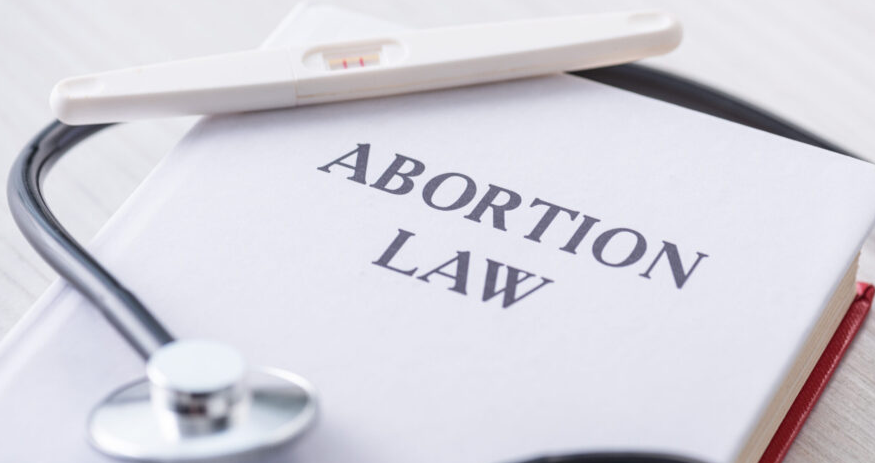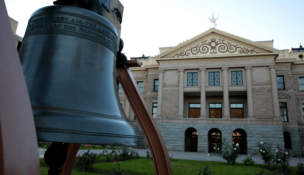Proposition 139 Sparks Legal Debate Over Abortion Rights and Parental Consent
Howard Fischer, Capitol Media Services//October 21, 2024//
Proposition 139 Sparks Legal Debate Over Abortion Rights and Parental Consent
Howard Fischer, Capitol Media Services//October 21, 2024//
Gov. Katie Hobbs insists that if voters approve Proposition 139 it won’t allow minors to get an abortion without parental consent.
That puts her at direct odds with foes who point out the measure would create a “fundamental right” to terminate an abortion – one that extends to “every individual.” And there is nothing about any age restrictions.
But it turns out that supporters of the initiative are not as convinced as the governor that the ballot measure actually would leave intact existing requirements for parental consent. Even Attorney General Kris Mayes, who backs Prop 139, said that question is likely going to have to be resolved by a judge.
And all this comes as opponents are hoping to use the issue of a parent’s right to consent to a child’s abortion to create enough doubt to quash the measure – which has strong financial backing – at the polls.
Those latest financial disclosure reports show that supporters of Prop 139 have so far collected nearly $32.7 million in their bid to convince voters to put that right to abortion into the state constitution. That includes almost $9.5 million in donations between July 14 and when the reporting period ended on Sept. 30.
The Fairness Project, a national group that supports abortion ballot measures here and in other states, gave more than $4.6 million. It, in turn, lists the source of its dollars as coming from corporations and limited liability companies.
There also is a $3.25 million donation from Advocacy Action Fund which identifies its financing as coming from Eric and Wendy Schmidt of California. The Bloomberg Billionaires Index reports his net worth at $32.8 billion.
And the Planned Parenthood Action Fund is listed as putting in $2.26 million, with its contribution listed as providing staff salaries.
Expenses so far, including the cost of paid petition circulators, total nearly $18.7 million. And that leaves Arizona for Abortion Access with slightly more than $12 million to spend now to generate support and get backers to the polls.
It is spreading some of that money around.
The campaign announced just last week it is providing $1 million in “organizing grants” to 13 groups in Cochise, Coconino, Maricopa, Pima, Pinal and Yuma counties working to turn out Arizonans in this year’s election.
“The funds will help grant recipients expand their canvassing efforts, educate Arizonans about reproductive freedom, and drive more voters to the polls,” Arizona for Abortion Access said in a press release.
All that money is swamping the opposition.
It Goes Too Far, the committee formed to convince voters to reject Prop 139, reports total donations at less than $1.3 million so far. After expenses, it lists $543,643 in the bank.
The biggest donation is $142,200 from David Lambert, a retiree from Tempe. There also is a $100,000 contribution from John Connelly, listed as an attorney from Tacoma, Wash.
A poll last month by the New York Times and Siena College found that 58% of likely voters in Arizona were in favor of the constitutional amendment. About a third of those questioned said they oppose it.
If approved, it would override current Arizona law, which bars abortion after 15 weeks except to save the life of the mother. That law also has no exceptions for rape or incest.
As crafted, the measure would add an amendment to the Arizona Constitution.
“Every individual has a fundamental right to abortion,” it reads. It also would bar enactment or enforcement of any law, regulation policy or practices that “denies, restricts or interferes with that right before fetal viability unless justified by a compelling state interest that is achieved by the least restrictive means.”
After viability – currently considered between 22 and 24 weeks – an abortion could be performed if a treating health care professional makes a “good faith judgment” that the procedure is necessary “to protect the life or physical or mental health of the pregnant individual.”
Cindy Dahlgren, communications director for Center for Arizona Policy Action, the political arm of the anti-abortion CAP, said the plain language of Proposition 139 backs the contention of foes that it would override any requirements for parental consent. The key, she said, is that wording creating a constitutional right for everyone.
“It would clearly be argued that ‘every individual’ includes minors,” she told Capitol Media Services.
Then there’s the language that bars the state from enacting, adopting or enforcing any regulation that denies, restricts or interferes with that right.
“It would be argued that Arizona’s parental consent law ‘interferes’ with a minor exercising her right to an abortion,” Dahlgren said.
Hobbs, however, said that even if the ballot measure overturns a specific restriction in current abortion law that requires parental consent for the procedure, minors still won’t be able to make that decision themselves.
“Health care providers would be subject to the same provisions relating to minors as they are under any other circumstance,” the governor said.
For example, there is a separate law – unrelated to abortion – that makes it a crime to perform a surgical procedure on a minor “without first obtaining a written consent of a parent or legal guardian.”
But the proponents of the initiative themselves admitted to Capitol Media Services that, despite what the governor is claiming, even they aren’t sure.
Attorney Andrew Gaona, who represents Arizona for Abortion Access, acknowledged that the measure does create “a fundamental right to abortion and sets forth the standard that existing and future laws regulating abortion must satisfy.”
But that, he said, is not definitive one way or the other.
“How that standard will apply to the more than 40 existing abortion-related statutes if a party chooses to challenge some or all of them will be determined by Arizona courts,” he said. And that includes parental consent.
Gaona isn’t alone.
Mayes also acknowledges that “fundamental right to abortion” that would be placed in the Arizona Constitution if Proposition 139 is approved. And she, like Hobbs, also supports the ballot measure.
“However, its potential effects on existing laws, including parental consent requirements, are not yet clear,” Mayes said in a response to a query from Capitol Media Services.
All that portends a legal fight. But it is one that the committee promoting the initiative says someone else will have to defend.
“As a campaign committee, Arizona for Abortion Access won’t be involved in that process and can’t predict the timeline, the parties who will bring those challenges forward, or any future court decisions,” said Gaona, the attorney for Arizona for Abortion Access.
But it may not even have to wait for someone to sue for that legal review to start.
“If Prop 139 passes, my office will conduct an analysis on its impact to other statutes,” Mayes said.
“As with most newly passed referendums, litigation may be necessary to determine the specific impact on state law,” she continued. “Ultimately, the courts may have to decide how any new constitutional provisions interact with current laws.”
Of note is that even if parental consent remains the law, there already is an option that allows some minors to bypass it.
There is separate language in the statutes that sets up a procedure for a judge to authorize an abortion on a minor if she can prove to a judge “she is sufficiently mature and capable of giving informed consent” without consulting a parent or guardian. That requires a judge to look at everything from the girl’s age and experiences working or living outside the home, traveling on her own and handling personal finances.
But there are other factors a judge can consider, including what steps she took to explore her options “and to the extent she considered and weighed the potential consequences of each option.” And judges can weigh her conduct since she found out she was pregnant “and her intellectual ability to understand her options and make an informed decision.”
It is an option that has been used.
The state Department of Health Services reports there were 250 abortions by girls younger than 18 in 2022, the most recent figures available. And 37 of those – about one out of every seven – was authorized by a judicial bypass.
Those same figures show there actually were 39 such requests filed. But the report does not detail what happened in the other two cases.
There also is something else to consider on the question of whether a right set forth in the Arizona Constitution – what Prop 139 would insert – actually keeps lawmakers from limiting who can exercise it, especially as it relates to minors.
Consider Article 2, Section 26 of the Arizona Constitution: The right of the individual citizen to bear arms in defense of himself or the state shall not be impaired.
Yet state lawmakers have enacted a series of restrictions on who can have a gun and where.
The open carrying of firearms is allowed only for those 18 and older, though juveniles can carry under the supervision of a parent, guardian or safety instructor. And the ability to get a permit to carry a concealed weapon is available only to those at least 21 – or 19 for those with military service.
But Bethany Miller, attorney for the Center for Arizona Policy, said the difference between this and what is in Prop 139 starts with the wording.
“The Arizona right to bear arms is not ‘fundamental,’ ” she told Capitol Media Services, the verbiage used in the initiative. And Miller cited a 1994 ruling by the state Court of Appeals which held that the right to bear arms is a qualified right, not an absolute right.
“In other words, Arizonans do not have the right to bear arms in any time or any way,” she said. “But contrast, Prop. 139’s fundamental right is likely to be interpreted as a near absolute right.”










































